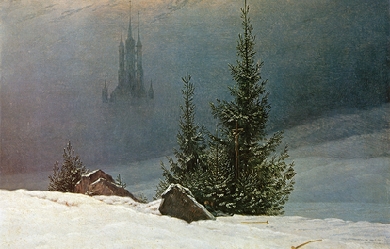Orpheus
A:
Not far from hence. From yonder pointed hill,
Crowned with a ring of oaks, you may behold
A dark and barren field, through which there flows,
Sluggish and black, a deep but narrow stream,
Which the wind ripples not, and the fair moon
Gazes in vain, and finds no mirror there.
Follow the herbless banks of that strange brook
Until you pause beside a darksome pond,
The fountain of this rivulet, whose gush
Cannot be seen, hid by a rayless night
That lives beneath the overhanging rock
That shades the pool—an endless spring of gloom,
Upon whose edge hovers the tender light,
Trembling to mingle with its paramour,—
But, as Syrinx fled Pan, so night flies day,
Or, with most sullen and regardless hate,
Refuses stern her heaven-born embrace.
On one side of this jagged and shapeless hill
There is a cave, from which there eddies up
A pale mist, like aereal gossamer,
Whose breath destroys all life—awhile it veils
The rock—then, scattered by the wind, it flies
Along the stream, or lingers on the clefts,
Killing the sleepy worms, if aught bide there.
Upon the beetling edge of that dark rock
There stands a group of cypresses; not such
As, with a graceful spire and stirring life,
Pierce the pure heaven of your native vale,
Whose branches the air plays among, but not
Disturbs, fearing to spoil their solemn grace;
But blasted and all wearily they stand,
One to another clinging; their weak boughs
Sigh as the wind buffets them, and they shake
Beneath its blasts—a weatherbeaten crew!
CHORUS:
What wondrous sound is that, mournful and faint,
But more melodious than the murmuring wind
Which through the columns of a temple glides?
A:
It is the wandering voice of Orpheus’ lyre,
Borne by the winds, who sigh that their rude king
Hurries them fast from these air-feeding notes;
But in their speed they bear along with them
The waning sound, scattering it like dew
Upon the startled sense.
CHORUS:
Does he still sing?
Methought he rashly cast away his harp
When he had lost Eurydice.
A:
Ah, no!
Awhile he paused. As a poor hunted stag
A moment shudders on the fearful brink
Of a swift stream—the cruel hounds press on
With deafening yell, the arrows glance and wound,—
He plunges in: so Orpheus, seized and torn
By the sharp fangs of an insatiate grief,
Maenad-like waved his lyre in the bright air,
And wildly shrieked ‘Where she is, it is dark!’
And then he struck from forth the strings a sound
Of deep and fearful melody. Alas!
In times long past, when fair Eurydice
With her bright eyes sat listening by his side,
He gently sang of high and heavenly themes.
As in a brook, fretted with little waves
By the light airs of spring—each riplet makes
A many-sided mirror for the sun,
While it flows musically through green banks,
Ceaseless and pauseless, ever clear and fresh,
So flowed his song, reflecting the deep joy
And tender love that fed those sweetest notes,
The heavenly offspring of ambrosial food.
But that is past. Returning from drear Hell,
He chose a lonely seat of unhewn stone,
Blackened with lichens, on a herbless plain.
Then from the deep and overflowing spring
Of his eternal ever-moving grief
There rose to Heaven a sound of angry song.
’Tis as a mighty cataract that parts
Two sister rocks with waters swift and strong,
And casts itself with horrid roar and din
Adown a steep; from a perennial source
It ever flows and falls, and breaks the air
With loud and fierce, but most harmonious roar,
And as it falls casts up a vaporous spray
Which the sun clothes in hues of Iris light.
Thus the tempestuous torrent of his grief
Is clothed in sweetest sounds and varying words
Of poesy. Unlike all human works,
It never slackens, and through every change
Wisdom and beauty and the power divine
Of mighty poesy together dwell,
Mingling in sweet accord. As I have seen
A fierce south blast tear through the darkened sky,
Driving along a rack of winged clouds,
Which may not pause, but ever hurry on,
As their wild shepherd wills them, while the stars,
Twinkling and dim, peep from between the plumes.
Anon the sky is cleared, and the high dome
Of serene Heaven, starred with fiery flowers,
Shuts in the shaken earth; or the still moon
Swiftly, yet gracefully, begins her walk,
Rising all bright behind the eastern hills.
I talk of moon, and wind, and stars, and not
Of song; but, would I echo his high song,
Nature must lend me words ne’er used before,
Or I must borrow from her perfect works,
To picture forth his perfect attributes.
He does no longer sit upon his throne
Of rock upon a desert herbless plain,
For the evergreen and knotted ilexes,
And cypresses that seldom wave their boughs,
And sea-green olives with their grateful fruit,
And elms dragging along the twisted vines,
Which drop their berries as they follow fast,
And blackthorn bushes with their infant race
Of blushing rose-blooms; beeches, to lovers dear,
And weeping willow trees; all swift or slow,
As their huge boughs or lighter dress permit,
Have circled in his throne, and Earth herself
Has sent from her maternal breast a growth
Of starlike flowers and herbs of odour sweet,
To pave the temple that his poesy
Has framed, while near his feet grim lions couch,
And kids, fearless from love, creep near his lair.
Even the blind worms seem to feel the sound.
The birds are silent, hanging down their heads,
Perched on the lowest branches of the trees;
Not even the nightingale intrudes a note
In rivalry, but all entranced she listens.


